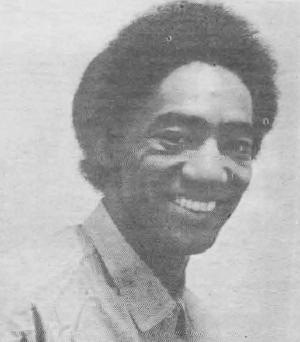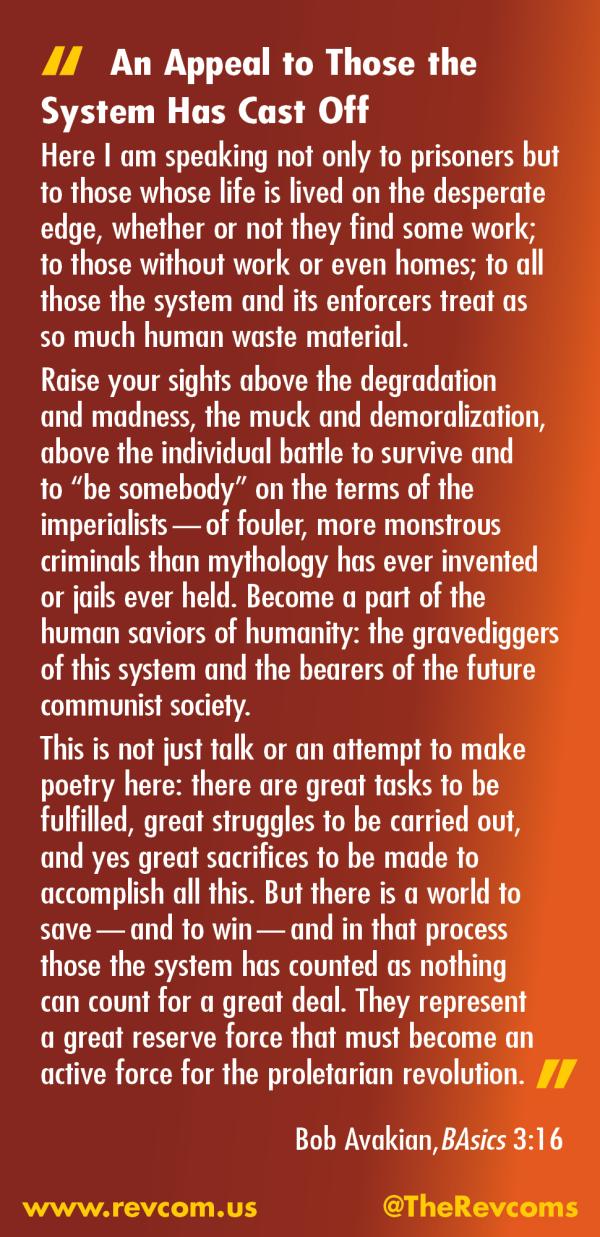
Ruchell “Cinque” Magee
Ruchell Magee, who had been one of the longest-held political prisoners in the U.S., finally won his release last month from a California prison after spending 67 of his 84 years behind bars. Through decades of unjust imprisonment, including some 17 years of torture in isolation cells, Magee has inspired many with his unrepentant stand and outspoken voice against what he has denounced as “the entire system, judicial and prison system, a system of slavery.”
Born in Louisiana in 1939, Ruchell Magee grew up in a society marked with Ku Klux Klan terror, violent “official” repression, and blatant discrimination against Black people. When he was 16, Magee was accused of raping a white woman. This was the very same year, 1955, that a gang of whites in Mississippi lynched 14-year-old Emmett Till and threw his body into a river—because Emmett whistled at a white woman. Magee wasn’t lynched… but he was declared “guilty” by an all-white jury in a “trial” lasting less than a day. The teenage Magee was sentenced to 12 years of hard labor at the notorious Louisiana State Penitentiary, known as “Angola”—the site of a former slave plantation on the banks of the Mississippi.
Released on parole from Angola in 1963, Ruchell headed to Los Angeles for a fresh start—but just six months later, he was caught in the bloody fangs of America’s racist in-justice system again. He was arrested after a street dispute over a small amount of marijuana. The Coalition to Free Ruchell Magee recounts, “As the police arrested him, they beat him so badly that he had to be hospitalized for three days, but the injustices were only beginning. The racist Superior Court of Los Angeles County railroaded him with the trumped-up charge of kidnapping to commit robbery. There was extreme malpractice from both the prosecutor and the defense attorney, which came to a head with Magee’s lawyer pleading him guilty without his consent. Ruchell was unjustly imprisoned with a seven-years-to-life charge for this alleged crime.”
In prison, Magee began to read and study widely, including law. He took on the name Cinque after the leader of the 1839 rebellion on the slave ship Amistad. He fought for his own release but also became a “people’s lawyer” who advocated for and helped other prisoners in their legal cases and spoke out fearlessly for prisoners’ rights. He said about his own legal battles, “This cause will benefit not just to myself but to all those who at this time are being criminally oppressed or enslaved by this system.” Ruchell Magee would continue this work through his hard years in prison.
One of the fellow prisoners that Magee came to know was George Jackson—who had been sent to prison at a young age for a small robbery and became a revolutionary associated with the Black Panther Party, amid the upsurge shaking the U.S. and the whole world in the 1960s. As revolutionary leader Bob Avakian notes, Jackson “grappled deeply with the question of revolutionary possibility, before he was assassinated by the authorities.”
George Jackson was murdered at San Quentin State Prison in August 1971, at a time when Jackson and two other prisoners (known as the Soledad Brothers) were facing charges carrying a possible death penalty, for allegedly killing a prison guard. A year earlier, in August 1970, Ruchell Magee and another prisoner were in a courthouse in Marin County, north of San Francisco, appearing as witnesses in a prisoner murder case. Suddenly, Jonathan Jackson, George Jackson’s brother, burst into the courtroom with a number of weapons, which he distributed to the two witnesses and the prisoner defendant. Jonathan Jackson and others took the judge, assistant DA, and three jurors as hostages and demanded freedom for George Jackson and the other Soledad Brothers. As they went into a van parked outside and were about to drive away, the police and prison guards opened fire. When the shooting by the cops and guards stopped, Jonathan Jackson, the prisoner defendant, Magee’s fellow prisoner witness, and the judge all lay dead. Magee was seriously wounded and unconscious, as was the prosecutor. One of the jurors was slightly injured.
Ruchell Magee was charged with simple kidnapping, aggravated kidnapping, and murder. After several legal twists and turns in the case, in January 1975, Magee was declared guilty on the aggravated kidnapping charge and sentenced to a life term. He was transferred from San Quentin to the high-security Folsom State Prison. Throughout this fight, Magee insisted that while he did not know in advance what was going to take place in the Marin County courtroom, “the reason for his participation in the abortive 1970 kidnapping operation was the very fact … that he had been ‘unjustly put behind bars’ and therefore had the right to liberate himself” (from “Addressing the Issue of Political Prisoners in the United States: Mumia Abu-Jamal and Ruchell Magee,” Michael Schiffmann and Linn Washington Jr.).
For the next 45+ years, Ruchell Magee was repeatedly denied parole, clearly for political reasons. A Los Angeles County District Attorney said in one early hearing, “The crimes committed by Magee and his whole behavior are proof of an adamant rejection of our system. … The prisoner has not given the slightest sign that he is willing to change his behavior or his attitude” (cited in “Addressing the Issue…”).

There are important things to learn from the arc of Ruchell Magee’s life—a youth at the bottom of Amerikkkan society who is nearly crushed by the workings of the system that rules over the people but transforms, in the face of the horrors and injustice, into an uncompromising fighter against that system who never capitulated despite many setbacks and difficulties. In contrast to the “me-first, fuck everyone else” mindset so prevalent in this society, even among the most oppressed, he took up the morality of struggling against the source of oppression and suffering, not just for himself but for others chained by that oppression, in the interest of the masses of people.
Today, there is actually a greater possibility of going much further beyond continuing to fight oppression and injustice under this system—there is, as Bob Avakian has analyzed scientifically, a greater possibility than at any previous time in this country of making actual revolution to abolish and dismantle the capitalist-imperialist system that is at the source of the horrors people face and replacing it with a fundamentally different system and a whole new way to live. And for the “nothing-to-lose” youth of today, and all others thirsting for radical change for the better, as Bob Avakian says, “There is plenty that needs to be done, and urgently, which requires real boldness and heart….”
